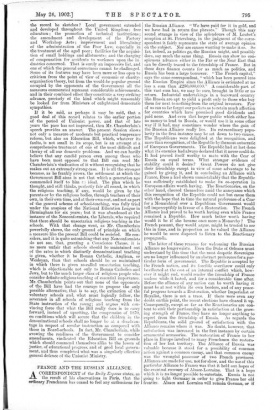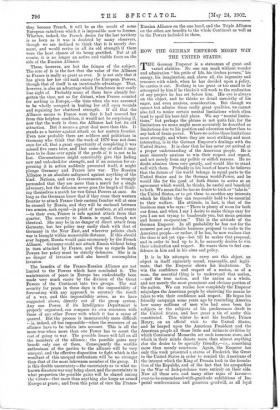FRANCE AND THE RUSSIAN ALLIANCE.
ACORRESPONDENT of the Daily Express states, as - the result of his observations in Paris, that the ordinary Frenchman has ceased to feel any enthusiasm for the Russian Alliance. "We have paid for it in gold, and we have had in return fine phrases." Though this may sound strange in view of the splendours of M. Loubet's reception at St. Petersburg, in the judgment of the corre- spondent it fairly represents the state of average opinion on the subject. Nor are causes wanting to make it so. So far, indeed, as politics go, the Russian might, and possibly does, say much the same thing. Russia can show no con- spicuous advance either in the Far or the Near East that can be directly traced to the friendship of France. But in these days finance counts for as much as politics, and Russia has been a. large borrower. "The French capital," says the same correspondent, "which has been poured into the Russian Empire since the Alliance is estimated at no less a sum than £280,000,000." A considerable part of this vast sum has, we may be sure, brought in little or no return. Industrial undertakings in a backward country like Russia are apt to yield a profit only to those who buy them for next to nothing from the original investors. Few of us can so far forget our pockets as to retain much affection for countries which have promised good dividends and paid none. And even that larger public which either has no money to lend to Russia, or would use it in some other way if it had, may sometimes wonder where the gain of the Russian Alliance really lies. Its extraordinary popu- larity in the first instance may be set down to two causes. The Republicans were delighted at the recognition, and more than recognition, of the Republic by the most autocratic of European Governments. The Republic had at last done what its enemies had always declared that it never could do. It had proved itself worthy to mato with the Czar of Russia on equal terms. What stronger evidence of stability could it desire? Great Powers do not give their friendship except in view of some advantage to be gained by giving it, and in concluding an Alliance with France, Russ a had shown unmistakably that the Republic was sufficiently established to make its co-operation iu European affairs worth having. The Reactionaries, on the other hand, cheered themselves amid the annoyance which this recognition of the Republic could not but cause them with the hope that in time the natural preference of a Czar for a Monarchical over a Republican Government would tell imperceptibly in favour of a Restoration. The French Alliance had proved to be worth having even while France remained a Republic. How much better worth having would it be if she became once more a Monarchy ? The French peasant, they would argue, might be trusted to see this in time, and in proportion as he valued the Alliance he would be more disposed to listen to the Reactionary propaganda.
The latter of these reasons for welcoming the Russian Alliance no longer exists. Even the Duke of Orleans must understand by this time that the most despotic Sovereigns are no longer influenced by an abstract preference for a par- ticular form of government. The Republic is accepted by the French nation, and its forcible overthrow could only be effected at the cost of an internal conflict which, how- ever it might end, would render the friendship of France useless while it lasted,. and for a considerable time after. Before the alliance of any nation can be worth having it must be at rest within its own borders, and of any ful progress towards a Restoration, whether Imperialist or there is not a trace. If there were even any doubt on this point, the recent elections have cleared it up. Consequently, except so far as the Reactionaries are con- tent to sink their partisanship in satisfaction at the grow- ing strength of France, they have no longer anything to expect from the friendship of Russia. As regards the Republicans, the solid ground of satisfaction with the Alliance remains where it was. No doubt, however, that satisfaction was increased in the first instance by certain ornamental accessories. The restoration of France to her place in Europe involved to many Frenchmen the restora- tion of her lost territory. The Alliance of Russia was valuable because it stood for a possibility of common action against a common enemy, and that common enemy was the wrongful possessor of two French provinces. Alliances are made for use, not for show, and the use of this particular Alliance to Franco was that it held out hopes of the eventual recovery of Alsace-Lorraine. That is a hope which it is no longer possible to entertain. Russia is not going to fight Germany in order to give France her old frontier. Alsace and Lorraine will remain German, or if they become French, it will be as the result of some European cataclysm which it is impossible now to foresee. Whether, indeed, the French desire for the lost territory is as keen as it was is doubted by many observers, though we are inclined to think that it is merely dor- mant, and would revive in all its old strength if there were the least chance of its being gratified. But at all events, it is no longer an active and visible force on the side of the Russian Alliance.
These, however, are but the fringes of the subject. The core of it is the fact that the value of the Alliance to France is really as great as ever. It is not only that it has given her her old rank among the European Powers, though that of itself is an inestimable advantage. That, however, is also an advantage which Frenchmen may easily lose sight of. Probably many of them have already for- gotten the time, not so far distant, when France counted for nothing in Europe,—the time when she was assumed to be wholly occupied in healing her still open wounds and regaining her shattered strength. If all that the Alliance means to France were that it had rescued her from this helpless condition, it would not be surprising if, now that the work is done, the Alliance had lost its old attraction. But it means a great deal more than this. It stands as a barrier o. attack on her eastern frontier. Even now probably there are soldiers and politicians in Germany who think that the work of 1870 was not done once for all, that a great opportunity of completing it was missed five years later, and that some day or other it may have to be done over again if the profit of it is not to be lost. Circumstances might conceivably give this feeling new and unlooked-for strength, and if an occasion for ex- pressing it in action suddenly presented itself, it might plunge Germany and France into war. The Russian _Alliance is an absolute safeguard against anything of the kind. Nations, and even Governments, may be wrongly persuaded that they are more than a match for a single adversary, but the delusion never goes the length of think- ing themselves a match for two Great Powers at once. So long as the Germans know that if they cross their western frontier to attack France their eastern frontier will at once be crossed by Russia, and they will be enclosed between two armies, each equal—in point of numbers, at all events —to their own, France is safe against attack from that quarter. The security to Russia is equal, though not identical. She may be in no danger of direct attack from Germany, but her policy may easily clash with that of Germany in the Near East, and wherever policies clash war is brought within measurable distance. If this should ever happen, Russia would gain enormously by the French Alliance. Germany could not attack Russia without being in turn attacked by France, and thus as regards both Powers her policy must be strictly defensive. She is in no danger of invasion until she herself contemplates invasion.
The benefits of the Franco-Russian Alliance are not limited to the Powers which have concluded it. The maintenance of peace in Europe has undoubtedly been made very much easier by the division of the Great Powers of the Continent into two groups. The real security for peace in these days is the impossibility of forecasting with any approach to accuracy the result of a war, and this impossibility arises, as we have suggested above,. directly out of the group system. Any one Power, if its Intelligence Department is properly organised, can compare its own resources with those of any other Power with which it has a cause of quarrel. But the process is immeasurably more difficult —is, indeed, all but impossible—when the resources of an affiance have to be taken into account. This is all the more true when more than one Power has to count the cost of going to war. The possible losses will fall on all the members of the alliance ; the possible gains may benefit only one of them. Consequently the warlike enthusiasm of the parties to the alliance will be very unequal, and the effective disposition to fight which is the resultant of this unequal enthusiasm will be no stronger than that of the most lukewarm member of the group. It is this double uncertainty—the uncertainty as to what un- known disasters war may bring about, and the uncertainty in what proportion the possible gains will be shared among the victors—that more than anything else keeps an armed Europe at peace ; and from this point of view the Franco- Russian Alliance on the one hand, and the Triple Alliance on the other, are benefits to the whole Continent as well as to the Powers included in them.







































 Previous page
Previous page